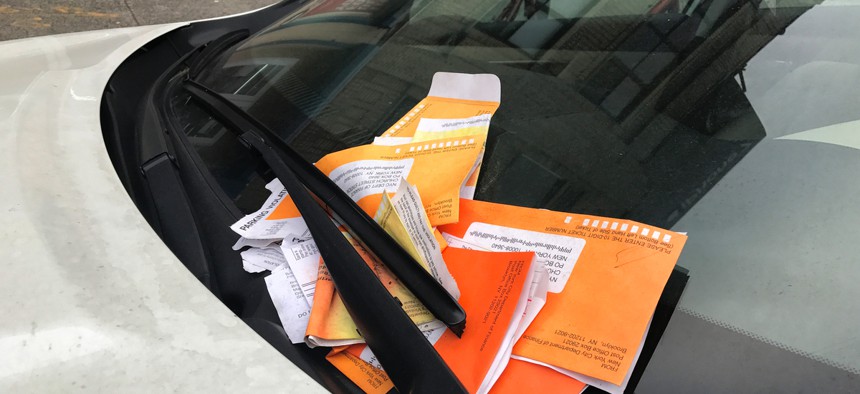Three Alternatives to the Usual Strategies for Collecting Fines and Fees

A new report suggests alternatives to traditional methods of fines and fees collection. Shutterstock
A report from the Fines and Fees Justice Center lays out alternatives for cities looking to make collection practices more equitable and efficient.
Reforming how cities collect fines like traffic tickets and fees like those in the court system has been a priority for many local leaders in recent years—a priority growing more urgent as the coronavirus pandemic leaves many people with less cash to pay their bills.
A new report from the Fines and Fees Justice Center, a research and advocacy organization, suggests that cities consider three alternatives instead of cracking down on people who don’t pay up. The center recommends jurisdictions start conducting ability-to-pay assessments, as well as offering payment plans and the opportunity to perform community service instead of paying money.
The three solutions don’t eliminate fines or fees, but Priya Sarathy Jones, the national policy and campaigns director for the FFJC, said that these reforms can benefit both city governments and their residents. “Punishing people because they don’t have money to pay court fines and fees is bad economic policy and one of the least efficient ways to raise revenue,” she said. “Instead of repeating the mistakes of the past, every state and local government should ensure that fines and fees are not a barrier to people caring for their own basic needs.”
A fine, put simply, is a punishment for violating a municipal code or state law, usually for a minor infraction, such as an overdue library book or running a red light. Fees are surcharges used to fund government services and the court system; often these are imposed for late payments. The alternatives to straight-forward collection are intended to make it more feasible for residents to pay state and municipal debts.
Ability-to-pay assessments evaluate whether someone can pay a fine or fee and, if so, how much of the fee is reasonable for their financial situation. Ability-to-pay policies “must include a presumption that some individuals will not have the ability to pay any fine, fee, or other monetary sanction,” the report reads. People who are on public assistance or have been homeless in the past year, along with those with a permanent physical disability, should be automatically exempted, the report suggests. If those reasons aren’t present, the court should conduct an income evaluation and determine what percentage of the fine should be paid based on where a person’s income tracks against the federal “very low-income” standard.
Payment plans are the follow-up step and “ensure that people can meet their own needs, as well as the needs of their families, while paying off their court debt.” The researchers suggest that courts shouldn’t charge a down payment to enroll in a plan and that required monthly payments shouldn’t exceed 2% of an individual’s monthly net income, or $10, whichever is greater.
After both of these options, the report states that courts should also offer people the chance to pay off debts through community service to offset part or all of the monetary sanction owed. An hour of community service counts towards the debt at “no less than twice the
state or local (whichever is higher) minimum wage,” researchers recommend.
The three options are most efficient when used simultaneously, the report says, and together can make payment systems more fair while improving the efficiency of debt payment monitoring. The report cites several states, like Washington, California, and Michigan that have successfully implemented ability-to-pay assessment tools. Bills currently before the state legislatures of New York and Florida are also highlighted for using the 2% or $10 rule for monthly payment plans.
In the past few years, many cities have turned a critical eye on their fines and fees collection practices. The mayors of Chicago, Durham, and St. Paul, Minnesota among others, have championed alternatives to fees—or tried to eliminate them altogether for institutions like libraries.
The economic fallout of the coronavirus pandemic has also spurred some cities to find ways to make it easier for residents to pay fines and fees as a time when household budgets may be tightening—though some cities that have championed fines and fees reform, like Chicago, are now reversing course and looking to increase collections as a way to patch up looming gaps in their budgets.
Reform is often painted as a racial equity priority, as the greatest burden of the costs in many cities falls on Black and Latino residents. Proponents also say that it isn’t fair for cities to collect a significant percentage of their revenue from those with the least ability to pay—Nashville’s recent review of their fines and fees system found it amounted to a “poor tax.”
Another big reason cities give for fines and fees reform is that it simply makes financial sense. Before St. Paul stopped collecting library late fees, for example, the city was spending $250,000 per year to recoup $215,000. Other cities have similar stories of overspending on collection efforts for measly or negative returns.
The FFJC report stresses that the three policy alternatives to traditional fines and fees collections are an interim step toward broader fines and fees reform that ween cities off dependence on this type of revenue—not “comprehensive solutions.” If cities do have to impose fines, they “should be both tailored to the offense and proportionate to an individual’s financial circumstances,” the report reads.
“More and more jurisdictions are turning to ability to pay assessments as an answer to their fines and fees problems,” added Sarathy Jones. “But without addressing the misuse of fines and fees in the criminal justice system, this is only a short term solution. These policies are only effective when they’re enacted in a meaningful, consistent way and coupled with broader fines and fees reforms.
Emma Coleman is the assistant editor for Route Fifty.
NEXT STORY: Two-Decade Push to Build a Grocery in a Food Desert Finally Pays Off






